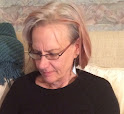When I heard that Cloris Leachman died last Thursday, I thought of her role in The Mary Tyler Moore Show. Starring as Phyllis Lindrom, Mary's snobby landlord and downstairs neighbor, Leachman delivered outstanding comedy whenever she appeared. In fact, two other women on the show did the same: Moore as Mary Richards and Valerie Harper as Rhoda Morgenstern. Together they created a world of funny women who made me laugh week after week, from 1970 - 1977.
 |
| Phyllis, Mary, and Rhoda's House |
They weren't the first, of course. Lucille Ball's I Love Lucy, beginning in 1951, aired as reruns when I was a kid in the 60s. I also liked Carol Burnett. Her late-night shows were perfect for babysitting jobs; she came on at 10:00 after the kids were in bed, and I would laugh at her hilarious sketches. Like Mary Tyler Moore, both Lucille Ball and Carol Burnett starred in shows named for themselves, unusual for women at that time.
 |
| Carol Burnett |
In fact, I remember my mother taking me to a program in 1970 when I was 14 that featured a slideshow of stereotypical roles held by women: housewives, teachers, nurses, secretaries, and stewardesses (as they were called then). These images appeared everywhere, as the presentation demonstrated--in advertising, children's literature, and popular culture. I no doubt remember this program because it marked the realization of something new: women could become more than the five roles that marked my childhood.
Around this same time came The Mary Tyler Moore Show. I had already grown to love Moore from her performance as Laura Petrie in The Dick Van Dyke Show, but now she had her own series. As the single adult Mary Richards living in Minneapolis, she became an example of a woman who could live on her own. She enjoyed her career and supported herself. Valerie Harper as Rhoda did the same. Though Phyllis (Leachman) was married, her husband Lars never appeared, and we often saw Phyllis as the refreshingly flawed mother of Bess (in contrast to the idealized mothers of June Cleaver in Leave It To Beaver and Margaret Anderson in Father Knows Best).
 |
| Bess & Mary |
Beyond the new role models that these characters portrayed, though, was the notion that women could be funny. This wasn't obvious then with comedians like Bob Hope, George Burns, Jack Benny, Don Rickles, and Johnny Carson prominent on TV. Frankly, women weren't even supposed to be funny; they might upstage men or appear unfeminine. At most they should laugh at men's jokes, not the other way around. But Mary Tyler Moore and her co-stars began to unravel yet another stereotype and brought women's voices to comedy, opening up the possibility for others to follow.
And best of all, they made me laugh.

No comments:
Post a Comment